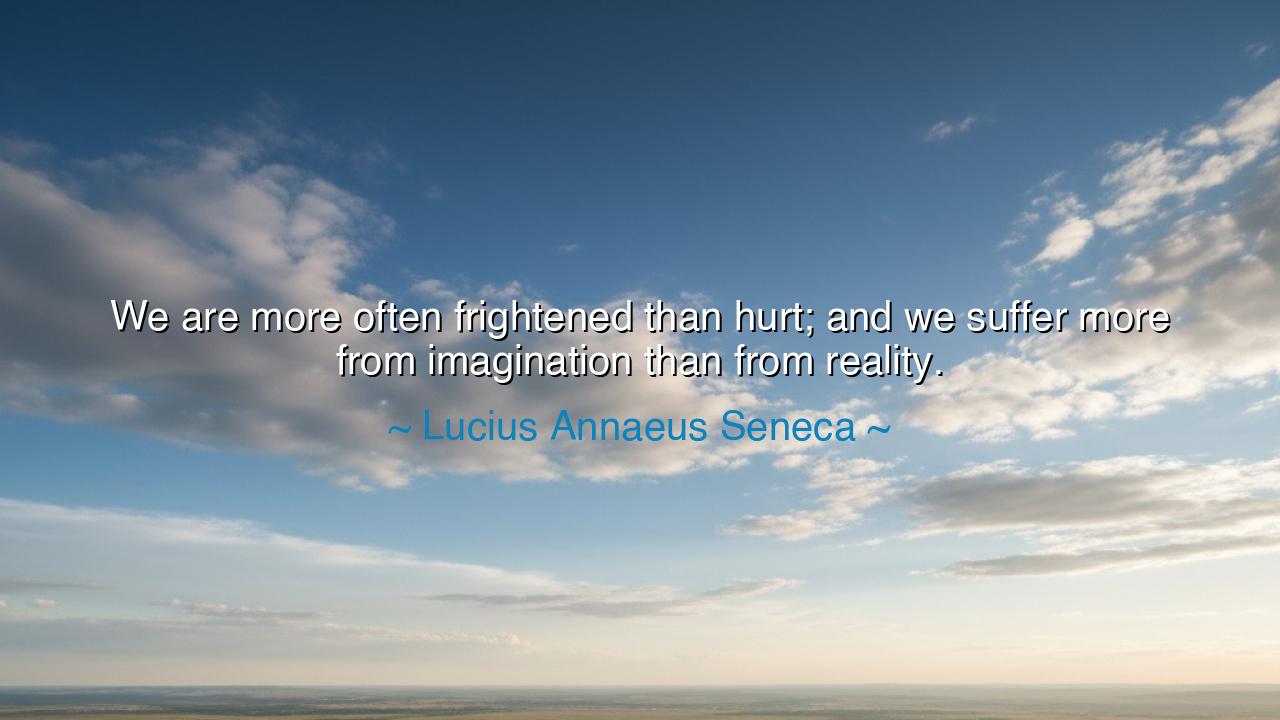
We are more often frightened than hurt; and we suffer more from
We are more often frightened than hurt; and we suffer more from imagination than from reality.






"We are more often frightened than hurt; and we suffer more from imagination than from reality." Thus spoke Lucius Annaeus Seneca, the Roman philosopher and stoic sage, whose words burn with the clarity of eternal truth. In this simple sentence, he revealed the secret torment of the human mind—that our fears wound us more deeply than life itself. The body is rarely struck by fortune’s blows, but the mind, unguarded and untamed, imagines a thousand misfortunes before one has even arrived. Imagination, that divine gift which can lift the soul to greatness, also carries the power to enslave it in phantom terrors. Seneca, who lived amidst emperors, intrigues, and death itself, knew that the greatest battlefield lies not in the empire, but within the heart.
In the age of Rome, when power was as fragile as glass and friends could become executioners overnight, Seneca watched many crumble—not from suffering, but from the fear of suffering. He himself was condemned to death by the very emperor he once counseled, yet he met his fate with calm, teaching his disciples even as he opened his own veins. To live in fear, he taught, is to die before one’s death. The wise man prepares, but he does not tremble. For fear multiplies pain; it builds monsters from shadows and chains from air. The imagination, left unchecked, makes the mind its own torturer.
Consider the story of Marcus Aurelius, another Roman steeped in Stoic wisdom. During times of plague and war, he did not retreat into despair. Instead, he wrote in his Meditations: “If you are distressed by anything external, the pain is not due to the thing itself, but to your estimate of it.” He understood what Seneca taught before him—that our suffering arises not from reality, but from our judgment of reality. When men face battle, it is not the sword that terrifies them first, but the image of the sword in their minds. Thus, courage is not the absence of pain, but the mastery of imagination.
Seneca’s insight reaches beyond the marble halls of Rome and into our own age. How many live in dread of what might happen, and thus ruin what already is? A man fears the loss of wealth, and so loses his peace long before his fortune. A woman fears rejection, and so silences her voice before anyone else does. Entire nations tremble at imagined enemies, and in that trembling, create real ones. Fear is a craftsman of illusions, shaping prisons where none exist. Reality, when faced, is often bearable; it is the fear of it that breaks us.
Yet Seneca did not teach that we should deny imagination—only that we must govern it wisely. For imagination is not the enemy; it is the chariot of the soul. When steered by reason, it leads us to art, invention, and virtue. But when driven by fear, it races toward ruin. The wise learn to distinguish between what is and what is imagined. They remind themselves, as Seneca did, that “misfortunes that never happen have made more cowards than real pain ever did.” By disciplining the mind, one can transform fear into foresight, and anxiety into readiness.
The Stoics, from Seneca to Epictetus, practiced this art daily. They would meditate each morning on adversity—not to invite fear, but to tame it. They imagined loss, hardship, even death, until these became familiar companions rather than devouring beasts. Thus, when fate’s storms did come, they were steady as mountains, for their minds had already walked the fire and returned unburned. In this, they discovered a great secret: that one cannot be harmed by the world if one does not first surrender to imagination’s tyranny.
So, my children of thought and courage, take this wisdom as a shield against the storms within. When fear rises, do not ask, “What if this happens?” Ask instead, “What is happening now?” Train your mind to dwell in the present, where pain is smaller and courage greater. Imagine not your doom, but your strength. Remember that your suffering often comes not from the wound, but from the story you tell about it.
In the end, Seneca’s truth endures like the marble of Rome itself: we are haunted not by life, but by our own imagination of it. Yet that same imagination, once mastered, can free us. Use it not to multiply fear, but to magnify resilience. Let your thoughts serve your strength, not your sorrow. For the world may strike you once—but your mind, if disciplined, need never strike you again. And in this mastery, you shall find peace greater than safety—the peace of one who has learned to suffer only what is real, and to fear nothing that is imagined.






AAdministratorAdministrator
Welcome, honored guests. Please leave a comment, we will respond soon